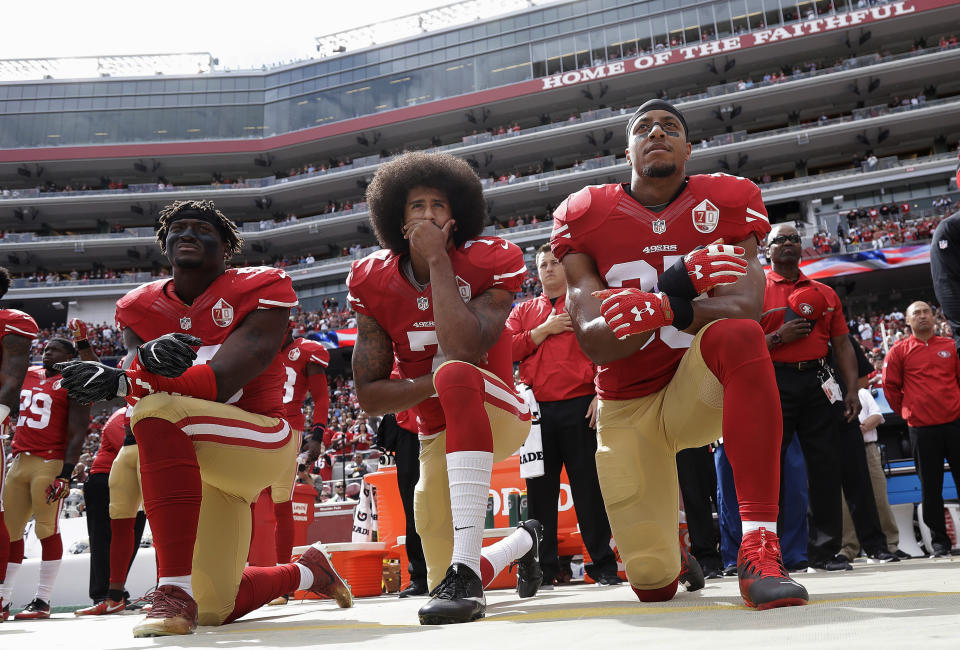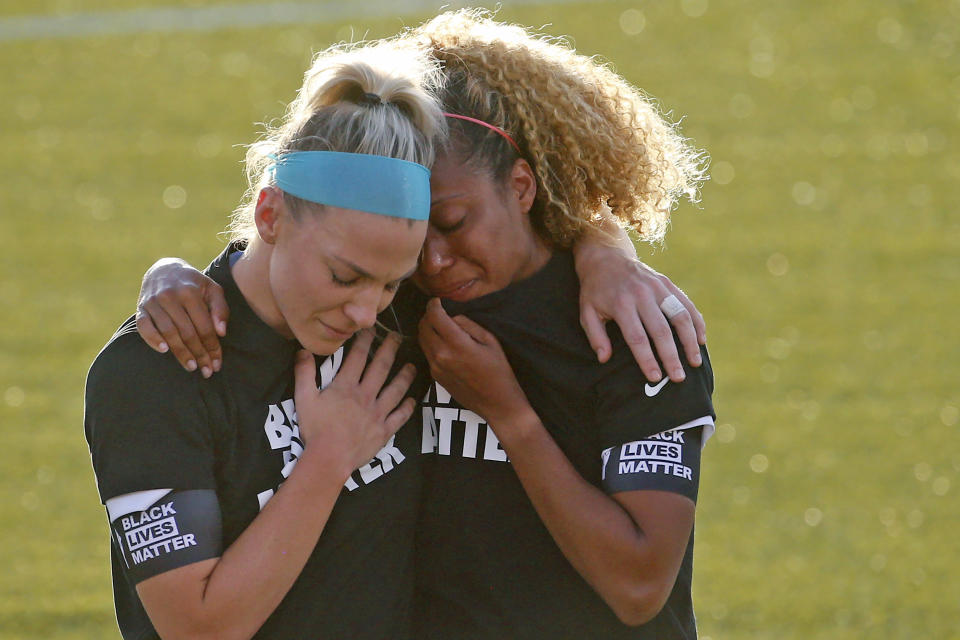Now is the time to stop playing the national anthem at sporting events

The moment was raw, powerful and maybe even a bit uncomfortable to watch — as if everyone was intruding on an intimate, private expression of pain.
There were no fans in the stadium due to the COVID-19 pandemic, of course, but the NWSL played “The Star-Spangled Banner” over a loud speaker anyway, and the CBS television camera fixated on two players.
Casey Short, a defender for the Chicago Red Stars who is Black, kneeled and sobbed as her teammate Julie Ertz, who is white, kneeled next to her and also cried. They hugged tightly, as if it would help them endure the 1 minute and 40 seconds of the anthem together.
Once the song hit its final flourish, they stood up, wiped the tears from their faces and were asked to go onto the field and try to win a soccer match, a jarring transition from deep-rooted real-life struggles to a literal game.
A powerful, emotional moment between Red Stars teammates Julie Ertz and Casey Short during National Anthem to open their #NWSLChallengeCup @cbschicago pic.twitter.com/KqjHGossDL
— Krista Ruch (@KristaCBS2) June 28, 2020
It was an affecting moment that perhaps crystalized the meaning of kneeling during the anthem as well as any since Colin Kaepernick first did it in 2016.
It should’ve never happened.
It’s long overdue that all American sports leagues stop playing the national anthem before sporting events — and now is the perfect time to put a stop to this outdated, misguided practice.
Why now is right time for sports to stop playing the anthem
When was the last time you went to a movie and, after the previews, everyone stood to salute the flag? What about “Jeopardy!” tapings? Does the audience belt out the anthem before the shows begin? Before the main act at a concert, should they play a recording of the national anthem first?
It never made sense to play the national anthem before games in American sports leagues. And yet, all of them do it. The NBA, the NFL and, yes, even the NWSL all force their players to line up and sing to an American flag before they are allowed to do their jobs.
It’s worth considering where this tradition came from. As the story goes, the crowd at the World Series in 1918 was somber as World War I dragged on. The band at the stadium played “The Star-Spangled Banner” during the seventh-inning stretch, and it breathed new life into the crowd, helping cement the tradition.
There are no crowds today due to the pandemic. And if leagues still play the anthem even though there are no crowds, who is it for? Is it for the Pentagon, who since 2012 has spent millions of taxpayer dollars for paid propaganda at sporting events (especially NFL games) as a military recruiting tool? Does anyone even know anymore?
Regardless, it’s an old tradition and we’re living in an unprecedented time when tradition is being thrown out the window. From the NBA to MLB, sports leagues are planning pandemic-proof events that require fresh approaches designed from scratch.
Everything about these upcoming tournaments is new, from the locations to the scheduling to the formats to the media coverage. So why should the pregame routine of playing the anthem stay the same?
MLS, which has its own one-off tournament set to begin July 8, has already ruled out playing “The Star-Spangled Banner” at games. It’s not because the league has as many foreign-born players as it does Americans and it’s weird to force them to participate in American patriotism. No, it’s because of the tradition’s roots: the crowds.
“We won’t be playing the anthems,” MLS commissioner Don Garber told reporters earlier this month. “There won’t be any fans in the stands so we didn’t see that it would be appropriate.”
The fans, of course, will return one day. But if leagues use this opportunity to stop playing the national anthem, they can normalize having sports without it.
After all, traditions evolve over time. They come, they go, they change. Sometimes it takes unusual circumstances to push that evolution along. A global pandemic may be as good a nudge as any to finally get rid of the anthem at sporting events.

Athletes can still protest racial oppression
Whether the anthem is played or not, Short, Ertz and any other NWSL player has the right to protest systemic racism in this country.
The NWSL on Saturday became the first professional team sports league to return since the killing of George Floyd, and the players were mindful of the platform they had.
They wore Black Lives Matter shirts during pregame warm-ups, and wore black armbands during the game. Before kickoff, they kneeled in a planned moment of silence. They weren’t going to avoid using their voices to draw attention to the cause — and that is to the players’ credit.
But playing the national anthem was ultimately the choice of the NWSL and (presumably) CBS.
The NWSL’s spokespeople did not respond to an email Sunday from Yahoo Sports asking why the anthem was played before games in empty stadiums. But the league was quick to share the image of Short crying on social media and in sponsored content, which felt more exploitative than empowering.
Indeed, much of the news coverage and social media discussion around the Red Stars game was about the moment shared between Short and Ertz. And also about Rachel Hill, a white Red Stars player who stood next to Short even as all her teammates kneeled. The game itself became an afterthought.
Short shared several thoughtful messages on fighting systemic racism on Twitter earlier this month, so we already have an idea of how she feels. The Red Stars did not make Short available to the media after Saturday’s game, and she has not yet spoken publicly about the moment.
She doesn’t need to. It’s her moment, not ours, and the NWSL never should’ve made her go through it on live television.
The question of whether the anthem should be played at sporting events is separate from asking whether players have the right to kneel during the anthem, and whether those displays are important.
Short’s display of emotion was powerful and important, especially in light of President Trump disgustingly retweeting a video that featured one of his supporters chanting “white power” the next day. (Trump later deleted the retweet.)
It’s also not Short’s responsibility, or the responsibility of any Black person, to suffer through trauma in front of a live audience so ignorant people can realize that racial oppression is real. It’s not fair to push her to be the symbol of the Black experience when she’s just trying to do her job.
Short is more than just a Black woman. She is a darn good soccer player who deserves a spot on the U.S. national team. She was robbed of the chance to show the world that on Saturday.
Red Stars coach Rory Dames gave this assessment of his team’s performance after a 2-1 loss:
“The emotions you saw Casey have prior to the game, and probably Julie at that point as well, a majority of our team has been having those kinds of emotions all day,” he said, “struggling with what was the right thing to do or how do you show solidarity, and how do you support the Black Lives Matter movement and what’s going on.”
“I would say we were pretty emotionally spent before we got here.”
If the pregame anthem causes that much anxiety and disruption within a team, is it worth doing? The players, after all, had prepared their own protests and gestures to support the Black Lives Matter movement, and it was on their own terms.
There was something different about the anthem — something that struck a deeper chord. It’s worth revisiting Colin Kaepernick’s explanation after he first declined to stand for the anthem in 2016.
“I am not going to stand up to show pride in a flag for a country that oppresses Black people and people of color,” Kaepernick said. “To me, this is bigger than football and it would be selfish on my part to look the other way. There are bodies in the street and people getting paid leave and getting away with murder.”
In light of the killing of Floyd and other unarmed Black people in recent years, Kaepernick’s sentiment is as relevant as ever. The truth some people don’t want to accept is that the flag and the anthem can’t mean the same thing for everyone if America’s institutions don’t protect everyone the same way.
At its heart, playing the national anthem at sporting events is a purely symbolic gesture. All symbols can change their meaning over time, and since 2016, the meaning of this one has changed significantly.
It’s time for leagues to acknowledge that. Once they do, the next course of action is clear.
More from Yahoo Sports:
